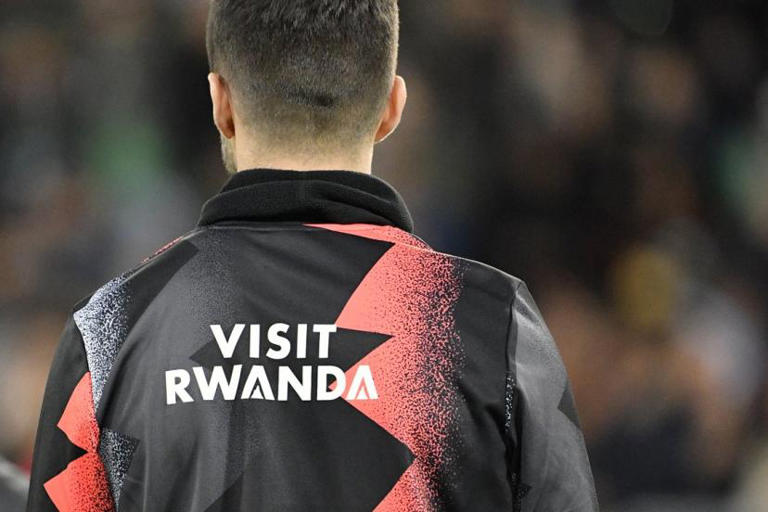
Since 2019, PSG (Paris Saint-Germain) has been linked to Rwanda by a partnership that brings in nearly €15 million per year to the French club. (B. Papon/L’Équipe)
The Government of Rwanda rejects recent attempts by the Democratic Republic of Congo (DRC) to undermine Rwanda’s international partnerships through misinformation and political pressure.
In a statement, Rwanda Development Board (RDB) says that these efforts not only misrepresent the truth but also threaten the foundations of regional peace, stability, and economic cooperation that we have worked tirelessly to build.
Rwanda’s partnerships with global sports organizations, including Arsenal FC, FC Bayern Munich, Paris Saint-Germain, or the Basketball Africa League (BAL), have been cornerstones of our strategy to foster economic growth, promote tourism, and strengthen community development. These collaborations transcend borders, inspiring millions across Africa and contributing to the continent’s socioeconomic progress.
Sports as a force for development and unity
Rwanda believes in the transformative power of sports to inspire, unite, and drive development across Africa. Through strategic partnerships with global sports organizations like Arsenal FC, Paris Saint-Germain, FC Bayern Munich, or the Basketball Africa League, Rwanda is working to become a hub for international sporting events and tourism. The partnerships have supported the growth of football and basketball, helped nurture regional and local talent, promoted local tourism, sports infrastructure development, and jobs. Attempting to politicize these partnerships is a misguided approach that overlooks the significant socio-economic benefits they deliver.
Sports have the power to unite communities, and drive meaningful change. The ‘Visit Rwanda’ initiative, at the heart of these collaborations, showcases Rwanda’s commitment to peace, stability, and inclusive growth. Undermining this vision does nothing to address the real challenges facing the eastern DRC.
Rwanda’s right to protect itself
The conflict along Rwanda’s border with eastern DRC stems from deep-rooted internal challenges within the DRC, particularly poor governance, ethnic discrimination, and the unchecked presence of multiple illegal armed groups. The M23 rebellion is fueled by demands from Congolese citizens for security and protection for their communities, following decades of systemic persecution. The DRC government’s failure to protect its people has left them exposed to ethnic violence and exploitation.
In particular, the FDLR militia, responsible for the 1994 genocide against the Tutsi, is directly backed by the DRC’s government and continues to pose a significant threat to Rwanda’s security.
The leadership of the DRC has escalated the situation by promoting hate speech against Congolese Rwandophones, called for attacks on Rwanda, and advocated for the overthrow of its government, which further undermines regional stability. Over time, the situation in eastern Congo has resulted in a significant refugee crisis, with Rwanda sheltering over 100,000 Congolese Tutsis fleeing persecution.
Despite these provocations, Rwanda has exercised great restraint, focusing on political dialogue and regional stability while safeguarding the security of its borders and the safety of Rwandans.
Commitment to dialogue, peace, and regional stability
Rwanda remains committed to peace and stability in the region. Our focus is on securing our borders and fostering cooperation to address the challenges of armed ethnic extremism in Eastern DRC, which we view as an existential threat and a matter of national security. Our efforts are aimed at creating a secure and stable environment that benefits all neighboring countries.
The allegations that Rwanda is exploiting minerals in the DRC are unfounded and a distraction from the DRC’s own mismanagement of its mining sector, including pervasive corruption, weak regulatory enforcement, and political instability.
Rwanda is committed to a political solution to the crisis in eastern DRC. This conflict requires a political settlement that addresses the root causes, including violent ethnic extremism, illegal armed groups, and the safe return of refugees. Rwanda continues to support the African-led mediation process as the only credible pathway to peace. We also advocate for the protection of the rights of minority groups in Eastern DRC, and the cessation of hostilities.
Rwanda’s commitment to development and prosperity
Rwanda’s economic progress is built on safety, stability, and good governance, which has resulted in a thriving tourism sector, and made Rwanda the second most popular destination for business events in Africa. We have made significant investments in infrastructure, human capital, and institutions to sustain this progress.
Rwanda’s vision of the future is one of peace and prosperity, and we aspire to continue fostering productive collaborations with all our neighbors, including the DRC, to enable regional development and growth.
Rwanda firmly believes in the transformational power of sports partnerships, which not only unite people across Africa but also promote social cohesion and economic growth. (End)
